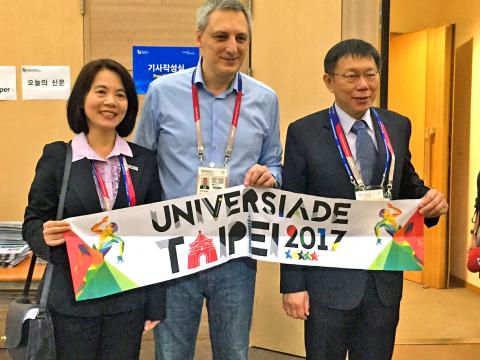The Taipei City Government yesterday confirmed reports that Deputy Taipei Mayor Chou Li-fang (周麗芳) has been relieved of her responsibilities as 2017 Universiade chief executive officer.
“The Universiade needs a full-time executive, but there is no way [Chou] can spend half of every day at the Taipei Arena,” Ko said, terming the change a “reassignment of duties.”
In response to media reports terming Chou “indecisive,” Ko said that everyone had their own opinion, but he believed in “using people’s strong points instead of their weaknesses.”

Photo: Kuo An-chia, Taipei Times
It was not necessary to respond to every criticism, he said.
Chou’s appointment as Taipei’s third deputy mayor came months after the appointments of the others in the role, while she assumed the post of Universiade executive after an open call for applications failed to find a suitable candidate.
At the time, Ko had expressed confidence in Chou’s ability to manage the event, despite her lacking an athletics background, saying that the executive committee that she would head would exercise “collective leadership.”
Chou said that finding a full-time Universiade CEO was necessary because the staff charged with organizing the event at the Taipei Arena should not be left “headless.”
“The responsibility of a deputy mayor is multi-layered and I can not move my office to the Taipei Arena just because of the Universiade,” she said, adding it was “necessary” to find someone to “share the burden.”
Chou said that her gaining the assent of the International University Sports Federation (FISU) for the transfer of the Universiade’s opening and closing ceremonies from the Taipei Dome to the Taipei Municipal Stadium demonstrated her ability.
Taipei applied for the change after conflict with the dome’s contractor Farglory Group (遠雄集團) created uncertainty over its completion date.
Chou is responsible for major international events such as the Universiade and next year’s World Design Capital as part of a broader division of duties that places her in charge of city “software” such as cultural events and marketing, with the other deputy mayors responsible for negotiations with outside groups and the “hardware” of city development plans.
Her previous responsibilities as Universiade CEO are to be shouldered by Research, Development and Evaluation Commission Chairman Chen Ming-shiun (陳銘薰).
Chou is to continue to serve as the vice-chairperson of the Universiade Hosting Committee to which the Universiade CEO reports.
Ko serves as the committee’s chairman.

An essay competition jointly organized by a local writing society and a publisher affiliated with the Chinese Communist Party (CCP) might have contravened the Act Governing Relations Between the People of the Taiwan Area and the Mainland Area (臺灣地區與大陸地區人民關係條例), the Mainland Affairs Council (MAC) said on Thursday. “In this case, the partner organization is clearly an agency under the CCP’s Fujian Provincial Committee,” MAC Deputy Minister and spokesperson Liang Wen-chieh (梁文傑) said at a news briefing in Taipei. “It also involves bringing Taiwanese students to China with all-expenses-paid arrangements to attend award ceremonies and camps,” Liang said. Those two “characteristics” are typically sufficient

A magnitude 5.9 earthquake that struck about 33km off the coast of Hualien City was the "main shock" in a series of quakes in the area, with aftershocks expected over the next three days, the Central Weather Administration (CWA) said yesterday. Prior to the magnitude 5.9 quake shaking most of Taiwan at 6:53pm yesterday, six other earthquakes stronger than a magnitude of 4, starting with a magnitude 5.5 quake at 6:09pm, occurred in the area. CWA Seismological Center Director Wu Chien-fu (吳健富) confirmed that the quakes were all part of the same series and that the magnitude 5.5 temblor was

The brilliant blue waters, thick foliage and bucolic atmosphere on this seemingly idyllic archipelago deep in the Pacific Ocean belie the key role it now plays in a titanic geopolitical struggle. Palau is again on the front line as China, and the US and its allies prepare their forces in an intensifying contest for control over the Asia-Pacific region. The democratic nation of just 17,000 people hosts US-controlled airstrips and soon-to-be-completed radar installations that the US military describes as “critical” to monitoring vast swathes of water and airspace. It is also a key piece of the second island chain, a string of

The Central Weather Administration has issued a heat alert for southeastern Taiwan, warning of temperatures as high as 36°C today, while alerting some coastal areas of strong winds later in the day. Kaohsiung’s Neimen District (內門) and Pingtung County’s Neipu Township (內埔) are under an orange heat alert, which warns of temperatures as high as 36°C for three consecutive days, the CWA said, citing southwest winds. The heat would also extend to Tainan’s Nansi (楠西) and Yujing (玉井) districts, as well as Pingtung’s Gaoshu (高樹), Yanpu (鹽埔) and Majia (瑪家) townships, it said, forecasting highs of up to 36°C in those areas